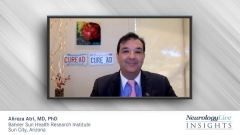
The Pathophysiology of Alzheimer’s Disease
Alireza Atri, MD, PhD, describes the pathophysiology of Alzheimer’s disease (AD).
Episodes in this series

Alireza Atri, MD, PhD: The pathophysiology of Alzheimer disease is complex. We can get into that a little, but the hallmarks of Alzheimer disease are the deposition of abnormal neuritic plaques made of amyloid beta protein and neurofibrillary tangles, which are made of abnormally hyperphosphorylated tau proteins. This was described over 115 years ago by Professor [Alois] Alzheimer, and it took another 60 or 70 years to realize that this was a common condition, but it’s a disease. Over the years, we found out what these proteins were and what was happening to them.
When I say it’s complex, it’s that our understanding has changed over the last 10 to 15 years because we appreciate that the disease process probably starts 20—or maybe even 25—years before individuals show symptoms. That’s when this amyloid protein, which is processed in a certain way, and the 42 amino acid components as a monomer becomes sticky, and then you get dimers and oligomers. This is synaptotoxic. It starts an inflammatory process but also starts causing hyperphosphorylation of tau protein, which stabilizes microtubules. Then you start getting a process that becomes not completely independent of amyloid protein and plaques, but it causes other streams of toxicity, which is causing inflammation and spreading through the brain.
Ultimately, the thought is that tangles start developing 10 to 15 years before and anywhere from 5 to 10 years before we can see structural and metabolic changes in the brain. This is before symptoms are developing. We’ve dissociated the clinical stages of the disease—where individuals show symptoms—from the preclinical stages, which can be many years long. This provides an opportunity to understand and intervene earlier. We’re in the new era of Alzheimer disease, to be able to measure these proteins and changes and intervene earlier.
This transcript has been edited for clarity.
Newsletter
Keep your finger on the pulse of neurology—subscribe to NeurologyLive for expert interviews, new data, and breakthrough treatment updates.











